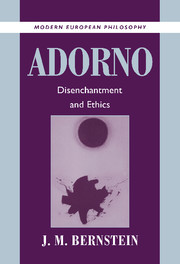Book contents
- Frontmatter
- Contents
- Preface
- List of Abbreviations
- Introduction
- 1 “Wrong Life Cannot Be Lived Rightly”
- 2 Disenchantment: The Skepticism of Enlightened Reason
- 3 The Instrumentality of Moral Reason
- 4 Mastered by Nature: Abstraction, Independence, and the Simple Concept
- 5 Interlude: Three Versions of Modernity
- 6 Disenchanting Identity: The Complex Concept
- 7 Toward an Ethic of Nonidentity
- 8 “After Auschwitz”
- 9 Ethical Modernism
- Index
4 - Mastered by Nature: Abstraction, Independence, and the Simple Concept
Published online by Cambridge University Press: 05 June 2012
- Frontmatter
- Contents
- Preface
- List of Abbreviations
- Introduction
- 1 “Wrong Life Cannot Be Lived Rightly”
- 2 Disenchantment: The Skepticism of Enlightened Reason
- 3 The Instrumentality of Moral Reason
- 4 Mastered by Nature: Abstraction, Independence, and the Simple Concept
- 5 Interlude: Three Versions of Modernity
- 6 Disenchanting Identity: The Complex Concept
- 7 Toward an Ethic of Nonidentity
- 8 “After Auschwitz”
- 9 Ethical Modernism
- Index
Summary
The individual is left with no more than the morality which Kantian moral theory, which accords affection, not respect, to animals, can muster only disdain: to try to live so that one may believe oneself to have been a good animal.
Bringing Nature Back In
The ethical impulse of Adorno's thinking, what it is to think the world as disenchanted, is fundamentally oriented by remorse, the need to make restitution, to repair the damage done, to seek reconciliation, to make amends. Only that backward-looking impulse, when elaborated, can do justice to the present in a manner that would redeem the hopes of the past. Before I can give substance to this ethical impulse (I conclude this chapter with an account of it), I must begin making amends for leaving out of account a major item in Adorno's argument: the role of nature. In a manner that is difficult to provide with conceptual clarity, Adorno consistently reads the dualisms implied in the Kantian contrast of concepts with intuitions - form and matter, universal and particular, spontaneity and passivity – as themselves darkly mirroring, in an epistemological register, the more fundamental duality of culture and nature. For Adorno and Horkheimer, rationalization desocializes nature (disenchantment) and denatures society, which is the explanation for society itself becoming desocialized, that is, an iron cage dominating persons.
- Type
- Chapter
- Information
- AdornoDisenchantment and Ethics, pp. 188 - 234Publisher: Cambridge University PressPrint publication year: 2001

